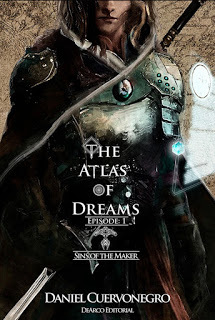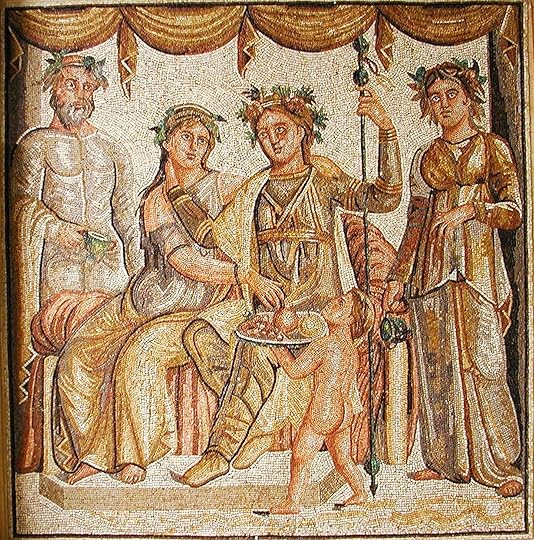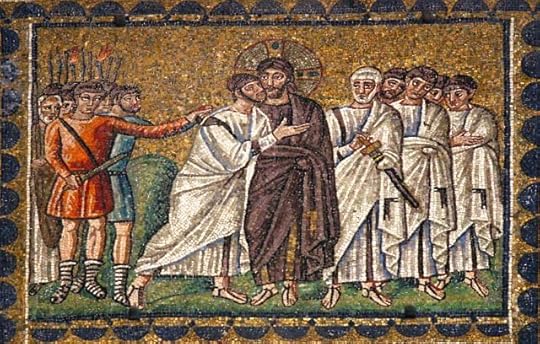Daniel Cuervonegro's Blog, page 3
July 16, 2020
The Atlas of Dreams – Sins of the Maker – Science Fantasy Novel

Episode 1 of The Atlas of Dreams Science Fantasy Series. Buy on Amazon
The Atlas of Dreams is a five-episode series, starting with Sins of the Maker, the setup and beginning of the rising conflict brought about by our search of transcendence and the paths we take towards it. After the stars have lost their energy and the universe reaches its final breaths, humanity strives for paradise. But the cost of it can be too great for those who must choose for the rest of us.
Follow the lives of seven protagonists as they endure the challenges of their time in the face of great spiritual upheaval and political turmoil. Explore the choices of the incarnation of God, a girl with the power to feed stars their light and machines their power; learn of an atheist in a world where God lives and how he struggles to find a moral balance where there seems to be none; unravel the political conspiracy that seeks to undermine the Imperium or exalt it to new heights; see the way soldiers fight in the armies of men and how their dreams make or break the future; meet with the frailty of childhood and how it can change under the fires of war; feel the inner struggle of a man destined for greatness yet drowning in the sorrows of regret, and see what happens when a man that has lost everything is given the power to do anything.
This is the Atlas of Dreams, our world expiring, our conscience rising. www.theatlasofdreams.com
Follow the Author: Instagram: https://www.instagram.com/thedreamatlas/ Twitter: @DCuervonegro Goodreads: Daniel Cuervonegro
History & Fantasy for Writers: Distinguishing Historical Periods
That's it.
Here... let's start with aesthetics and go from there:
Introduction to Classical, Medieval, and Renaissance Art
500 BC AD 500 AD 1400 AD 1650
Classical Period
The Classical Period covered the height of the Greek culture and the Roman Empire, from its rise to its fall, about 500 BC to AD 500. The people of these ancient societies developed many of the ideas that, today, make up our mathematics, science, literature, and art.
Forms of Art: sculpture, painted pottery, murals, mosaics
Purposes: to show the importance of people and leaders, as well as gods and goddesses.
Characteristics of Classical Art
figures look idealized, perfect
bodies look active, move convincingly
bodies are often nude, sometimes draped in togas
faces are bland and clam, without emotion
scenes show heroic figures or real people doing real tasks of daily life
little background or sense of perspective (when distant objects look smaller and far away)
Medieval Period
The Medieval Period in Europe, which lasted roughly from AD 500 to AD 1400, was characterized by the rise of feudalism and the controlling power of the Catholic Church in people’s lives.
Forms of Art: stained-glass windows, sculptures, illuminated manuscripts, paintings, tapestries
Purposes: to teach religion to people who cannot read or write.
Characteristics of Medieval Art
subjects mostly religious
figures look flat and stiff with little real movement
important figures are large
fully clothed, draped in deeply carved, still-looking clothes
faces are solemn with little emotion
paintings use vibrant colours
flat, two-dimensional painted figures
backgrounds a single colour, often gold, no interest in creating a realistic space
Renaissance
The Renaissance included a rebirth of interest in Classical culture. It began around 1400 and lasted until 1650. People rediscovered the writings and artworks of the Greeks and Romans, borrowed their ancient ideas, and combined them in new ways.
Forms of Art: sculptures, murals, drawings, paintings
Purposes: to show the importance of people and nature, not just religion
Characteristics of Renaissance Art
both religious and nonreligious scenes
figures look idealized, perfect
bodies may look active, moving
bodies may be nude or clothed
real people doing real tasks of daily life
faces express what people are thinking
colours respond to the light that falls on them
interest in nature, lots of natural detail
paintings are symmetrical (balanced on both sides)
How can you use this?understanding the progression of art and the time between these progressions you may visualise the changes in your own fantasy worlds. Ask questions like:How long before an art style changes? How long before influences from afar change a people's idea of beauty?Which elements belong to pre-modern societies (classical or feudal) and which to a proto-modern (Renaissance)?



Can you tell which belongs to which?
History & Fantasy for Writers #1
That's it.
Here... let's start with aesthetics and go from there:
Introduction to Classical, Medieval, and Renaissance Art
500 BC AD 500 AD 1400 AD 1650
Classical Period
The Classical Period covered the height of the Greek culture and the Roman Empire, from its rise to its fall, about 500 BC to AD 500. The people of these ancient societies developed many of the ideas that, today, make up our mathematics, science, literature, and art.
Forms of Art: sculpture, painted pottery, murals, mosaics
Purposes: to show the importance of people and leaders, as well as gods and goddesses.
Characteristics of Classical Art
figures look idealized, perfect
bodies look active, move convincingly
bodies are often nude, sometimes draped in togas
faces are bland and clam, without emotion
scenes show heroic figures or real people doing real tasks of daily life
little background or sense of perspective (when distant objects look smaller and far away)
Medieval Period
The Medieval Period in Europe, which lasted roughly from AD 500 to AD 1400, was characterized by the rise of feudalism and the controlling power of the Catholic Church in people’s lives.
Forms of Art: stained-glass windows, sculptures, illuminated manuscripts, paintings, tapestries
Purposes: to teach religion to people who cannot read or write.
Characteristics of Medieval Art
subjects mostly religious
figures look flat and stiff with little real movement
important figures are large
fully clothed, draped in deeply carved, still-looking clothes
faces are solemn with little emotion
paintings use vibrant colours
flat, two-dimensional painted figures
backgrounds a single colour, often gold, no interest in creating a realistic space
Renaissance
The Renaissance included a rebirth of interest in Classical culture. It began around 1400 and lasted until 1650. People rediscovered the writings and artworks of the Greeks and Romans, borrowed their ancient ideas, and combined them in new ways.
Forms of Art: sculptures, murals, drawings, paintings
Purposes: to show the importance of people and nature, not just religion
Characteristics of Renaissance Art
both religious and nonreligious scenes
figures look idealized, perfect
bodies may look active, moving
bodies may be nude or clothed
real people doing real tasks of daily life
faces express what people are thinking
colours respond to the light that falls on them
interest in nature, lots of natural detail
paintings are symmetrical (balanced on both sides)
How can you use this?understanding the progression of art and the time between these progressions you may visualise the changes in your own fantasy worlds. Ask questions like:How long before an art style changes? How long before influences from afar change a people's idea of beauty?Which elements belong to pre-modern societies (classical or feudal) and which to a proto-modern (Renaissance)?



Can you tell which belongs to which?
June 25, 2020
Promotional video for The Atlas of Dreams - Sins of the Maker
Episode 1 of The Atlas of Dreams Science Fantasy Series. https://www.amazon.com/Atlas-Dreams-Sins-Maker-ebook/dp/B089RQ1VP1/ref=tmm_kin_swatch_0?_encoding=UTF8&qid=&sr=
The Atlas of Dreams is a five-episode series, starting with Sins of the Maker, the setup and beginning of the rising conflict brought about by our search of transcendence and the paths we take towards it. After the stars have lost their energy and the universe reaches its final breaths, humanity strives for paradise. But the cost of it can be too great for those who must choose for the rest of us. Follow the lives of seven protagonists as they endure the challenges of their time in the face of great spiritual upheaval and political turmoil.
Explore the choices of the incarnation of God, a girl with the power to feed stars their light and machines their power; learn of an atheist in a world where God lives and how he struggles to find a moral balance where there seems to be none; unravel the political conspiracy that seeks to undermine the Imperium or exalt it to new heights; see the way soldiers fight in the armies of men and how their dreams make or break the future; meet with the frailty of childhood and how it can change under the fires of war; feel the inner struggle of a man destined for greatness yet drowning in the sorrows of regret, and see what happens when a man that has lost everything is given the power to do anything.
This is the Atlas of Dreams, our world expiring, our conscience rising.
www.theatlasofdreams.com
Follow the Author:
Instagram: https://www.instagram.com/thedreamatlas/
twitter: @DCuervonegro
Goodreads: Daniel Cuervonegro
The Atlas of Dreams – Sins of the Maker – Science Fa...
Episode 1 of The Atlas of Dreams Science Fantasy Series. https://www.amazon.com/Atlas-Dreams-S... The Atlas of Dreams is a five-episode series, starting with Sins of the Maker, the setup and beginning of the rising conflict brought about by our search of transcendence and the paths we take towards it. After the stars have lost their energy and the universe reaches its final breaths, humanity strives for paradise. But the cost of it can be too great for those who must choose for the rest of us. Follow the lives of seven protagonists as they endure the challenges of their time in the face of great spiritual upheaval and political turmoil. Explore the choices of the incarnation of God, a girl with the power to feed stars their light and machines their power; learn of an atheist in a world where God lives and how he struggles to find a moral balance where there seems to be none; unravel the political conspiracy that seeks to undermine the Imperium or exalt it to new heights; see the way soldiers fight in the armies of men and how their dreams make or break the future; meet with the frailty of childhood and how it can change under the fires of war; feel the inner struggle of a man destined for greatness yet drowning in the sorrows of regret, and see what happens when a man that has lost everything is given the power to do anything. This is the Atlas of Dreams, our world expiring, our conscience rising. www.theatlasofdreams.com Follow the Author: Instagram: https://www.instagram.com/thedreamatlas/twitter: @DCuervonegro Goodreads: Daniel Cuervonegro



